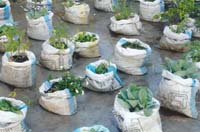|
City Farming -
the new green revolution Dr R R Deshpande, CLEAN-Aurangabad clean_aurangabad@yahoo.co.in Urban India is likely to face a massive waste disposal problem in the coming years. A closer look at the current and future scenario reveals that waste needs to be treated scientifically and holistically, recognizing its natural resource roots as well as health impacts. The need of the hour is to manage it at the source itself as far as possible. A major portion of the waste generated in households (80%) is organic in nature, i.e., it is biodegradable. The disposal of solid waste can be done effectively through City Farming at the source itself.
Bhartiya Vidya Bhawan, CLEAN-Aurangabad Regional Centre have introduced the concept of city farming for organic waste management at source. It is an innovative technology which solves the twin purpose of solid waste management & farming in urban areas. It has been invented and introduced by Padmashri Dr. R.T. Doshi and has been registered under the Indian Patent Act. It is the latest scientific invention for disposal of organic garbage at source simultaneously growing vegetables, fruits etc. By adopting this city farming in community, the responsibility of the municipality for the disposal of organic waste is greatly reduced, reaching the zero level progressively. Requirements of City Farming Sun, little water, cow dung, little soil, sugarcane residue (baggase), organic waste generated in the house, woven plastic bags (for bag method) and metal/plastic drums (for drum method). Beneficiaries
What needs to be done We need to motivate citizens in large numbers to practice City Farming which can lead to the management of 75% of solid waste at source. The only requirement on the part of the citizens is to have will and determination to do it and on the part of civic authorities to undertake City Farming on a large scale for municipal solid waste management. q
The author is
working with Bharatiya Vidya Bhavan,
" It was not man who owned the world at the beginning. Man developed physically, as we find...at a very late stage. The planet started with micro-life" — Sonali Suresh, CLEAN-Bangalore
|
|||||||||||||||||||||||||||||||||||||||||||||||||||||||||||||||||||||||
